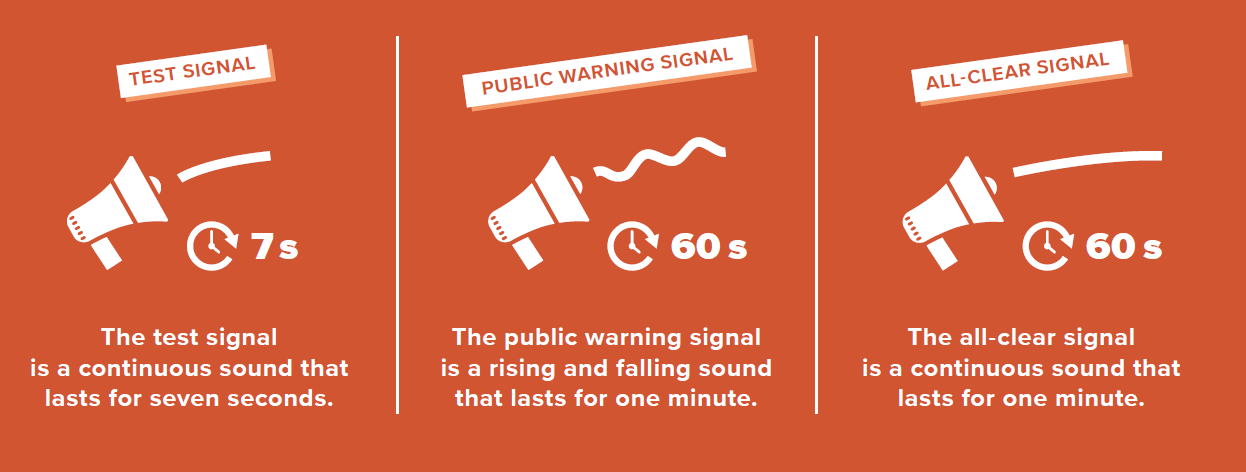

Alarm signal
The public warning signal is part of a multi-channel warning system
In hazardous situations and emergencies, the authorities warn the public of a direct and imminent danger to the population with a general alarm signal and an emergency warning. The general alarm signal is sounded using sirens placed outdoors or, outside urban areas, mobile sirens on a vehicle. The public warning system does not cover the whole country. Sirens are primarily located in areas with the highest number of people. The warning sirens are mainly intended to warn people who are outdoors, and the sound may not be loud enough to be heard indoors at all. The terrain, the built environment and the weather also affect the audibility of the sirens.
It is important that everyone can recognise the test and warning signals and know what to do when they hear the public warning signal.

- Public warning signal is a rising and falling sound that lasts for one minute, or a warning issued using loudspeakers.
- The all-clear signal is a continuous sound that lasts for one minute. It indicates that the threat or danger has passed.
- The test signal is a continuous sound that lasts for seven seconds. Warning sirens are tested at 12.00 noon on the first Monday of each month, with the exception of public holidays. The test may also include an announcement ‘hälyttimien kokeilu, prov alarm, testing sirens’. The test signal does not require people in the area to take any action.
Listen to a sample of the rising and falling danger sign:
What to do if you hear the alarm signal
- Go indoors.
- Close all doors, windows, air vents and ventilation systems.
- Stay calm, turn on the radio and wait for instructions.
- Avoid using the phone (including 112 calls) to prevent congestion on the lines.
- Stay indoors.
- Do not leave the area: travelling could be dangerous.
Staying indoors and following instructions in a hazardous situation is the first step to protecting yourself, and it is usually enough. Even in exceptional circumstances. Once inside, close the doors, windows and air vents, and shut off ventilation, if possible. When the danger is over, the all-clear signal will be sounded. Everyone should recognise the alarm signal and know what to do when you hear it.
An emergency warning is always issued as the alarm signal goes off
The authorities have many ways to warn people. The most important method is an emergency
warning, which is always issued as the public warning signal goes off. The emergency warning is read out on the radio and displayed on teletext page 112 and, if necessary, on television as running text at top of the screen. The emergency warning is also published through the 112 Suomi mobile app, the YLE Uutisvahti news feed application and on the pelastustoimi.fi and 112.fi sites.
Be cautious about information on social media. Check the source of the information and follow official channels used by the authorities.
An alarm signal is sounded in the event of a gas leak or radiation hazard
In the event of a gas leak, follow the instructions above, but also note the following:
If you are already indoors and smell gas
- Put a wet cloth in front of your mouth and breathe through it.
- Go upstairs and stay there if possible.
- Stay calm, listen to the radio and wait until the danger is over.
If you are outdoors and cannot go inside
- Move in a crosswind direction to try and get away from the gas cloud.
- Go to a location that is as high as possible, such as a hilltop.
- Put wet clothing, grass, peat or moss in front of your mouth and breathe through it.
In the event of a radiation hazard:
The radiation situation is continuously monitored throughout Finland. Even very minor changes in radiation levels are detected at once, and citizens are informed immediately.
1. Go indoors
Seal the doors, windows and air vents (adhesive tape, towels, clothing) and shut off the ventilation system. This way you can keep radioactive particles out. Move to central parts of the house/flat. The best protection is offered by an underground, well-sealed basement with no windows.
2. Prepare to take an iodine tablet
Only take an iodine tablet if you are told to do so by the authorities on the radio or TV. Iodine tablets prevent the accumulation of radioactive iodine in the thyroid gland but do not provide any other protection against radiation. Be prepared in advance and purchase iodine tablets at a pharmacy. You may not/cannot go out and buy iodine tablets in the middle of a hazardous situation.
3. Protect water and food – also for animals
Package food in tight containers or plastic bags. Put the tightly sealed foods into a fridge or freezer, as these appliances give effective protection against radioactive dust. Also protect food, fodder and water intended for animals.
4. Read, listen to and look up additional instructions and follow the media
More instructions will be issued by the rescue authorities, the police, the Ministry of the Interior or the Finnish Radiation and Nuclear Safety Authority, usually on all media including the radio, television, the Internet, and Yleisradio’s teletext pages 868 (Rescue services) and 867 (Radiation safety pages). Be cautious about social media publications and check their source.
Do I really have to go out?
Think carefully: do you really need to go out? If you find that you do, put on tight-fitting clothes that cover your entire body and skin. For example, you could wear rain clothes. Use a respirator mask or cover your face with a towel or a paper towel to prevent radioactive particles from entering your lungs. When you return, rinse the rain clothes before coming inside (if possible). When you come in, take all your clothes off in the hall, close the hall door and wash yourself carefully.
Read more:
More information about the 112 Suomi mobile application
STUK - The authorities cooperate in the event of a radiation hazard situation
Alarm signal
Police
Finnish Radiation and Nuclear Safety Authority
Ministry of the Interior
Rescue departments


